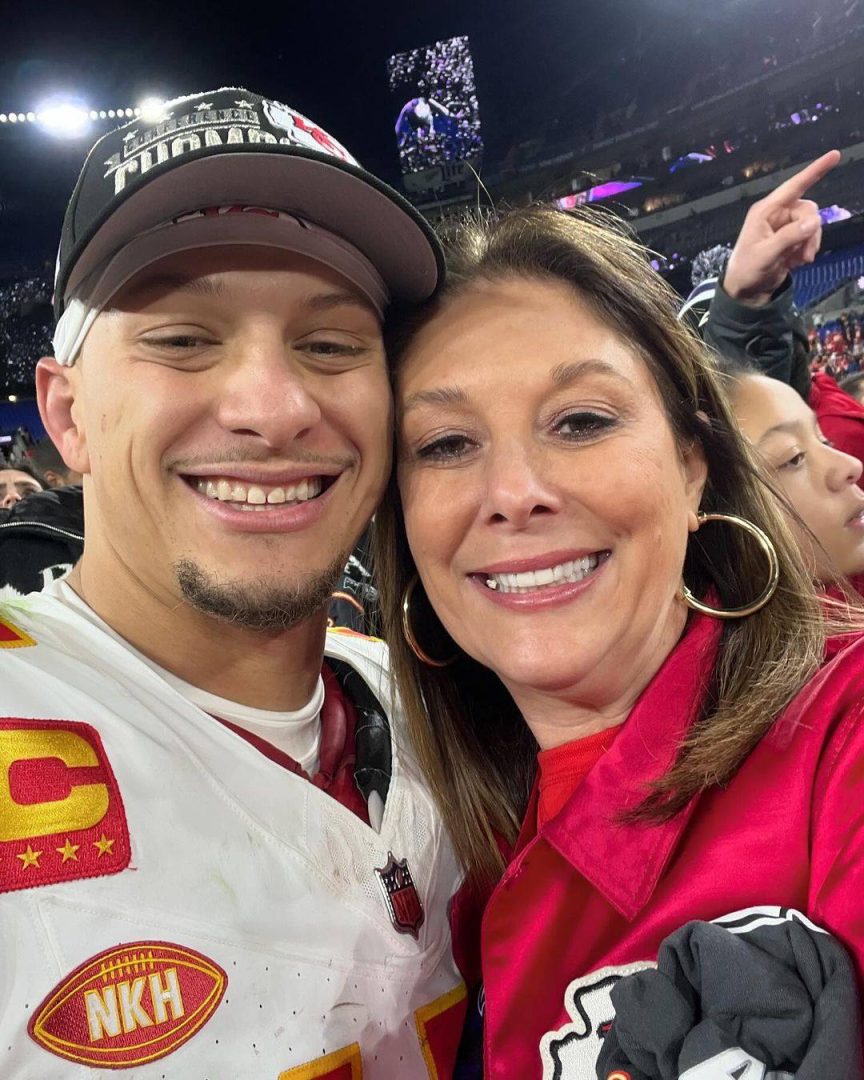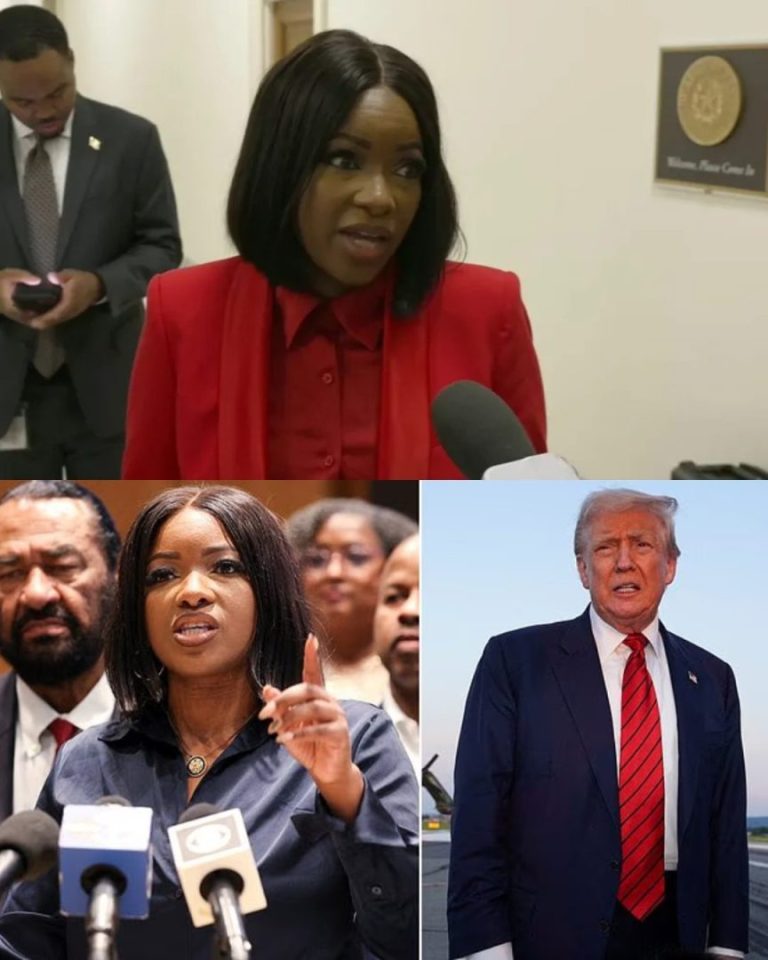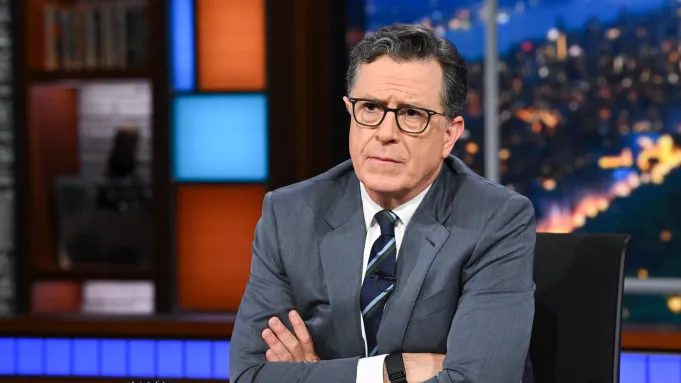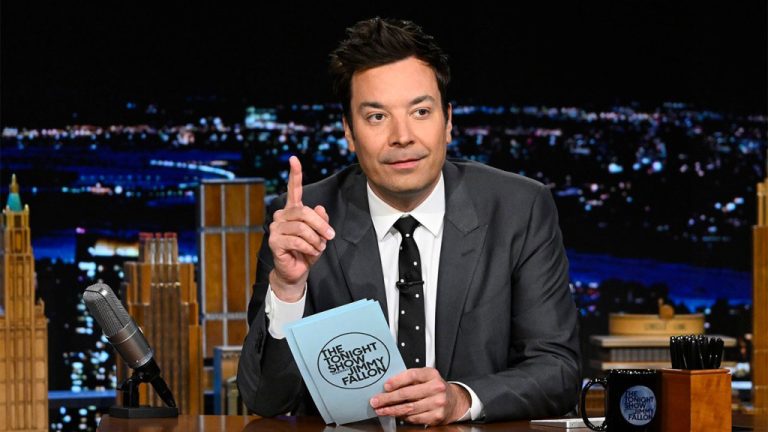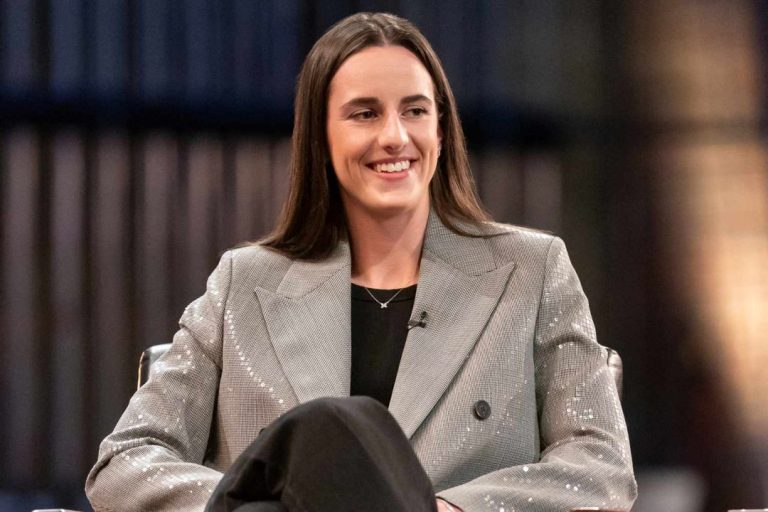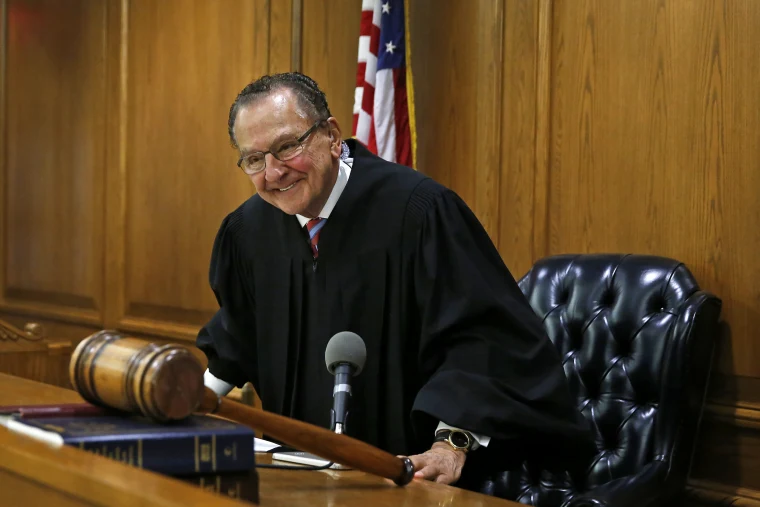In the high-octane world of professional sports, few names shine brighter than Patrick Mahomes—the Kansas City Chiefs’ superstar quarterback, two-time NFL MVP, and face of a new generation. But this week, it wasn’t Patrick making headlines. Instead, the spotlight shifted to his mother, Randi Mahomes, whose candid remarks on one of the most divisive issues in athletics—transgender women competing in women’s sports—sparked a firestorm of debate that reached far beyond the gridiron.
“As a female, I think that it’s not a fair matchup,” Randi said, her voice steady but unmistakably passionate. “I love everyone, but when it comes to physical strength and just our DNA, I don’t think it’s fair because I do have a daughter, and I do have a son. As you develop, there is a difference.”

“There is a difference in DNA,” she continued. “I just think that women really need to be with women and men need to be with men.”
Her words, delivered with maternal conviction, instantly reverberated across social media, sports talk shows, and the broader cultural conversation. Supporters hailed her for “speaking the truth.” Critics accused her of perpetuating exclusion. But beneath the noise, Randi Mahomes touched a nerve—one that goes to the very heart of what it means to compete, to belong, and to be recognized in the modern world of sports.

The Context: A Nation Divided Over Fairness and Inclusion
The debate over transgender inclusion in sports is not new. For years, athletes, activists, scientists, and policymakers have wrestled with the question: How do we balance fairness with inclusion? How do we honor the rights and identities of transgender athletes while preserving the integrity of women’s competition?
The issue is complex, emotional, and deeply personal. On one side are those who argue that transgender women—assigned male at birth but living and competing as women—should have the right to participate fully in women’s sports. They point to the importance of dignity, equality, and the need to combat discrimination.
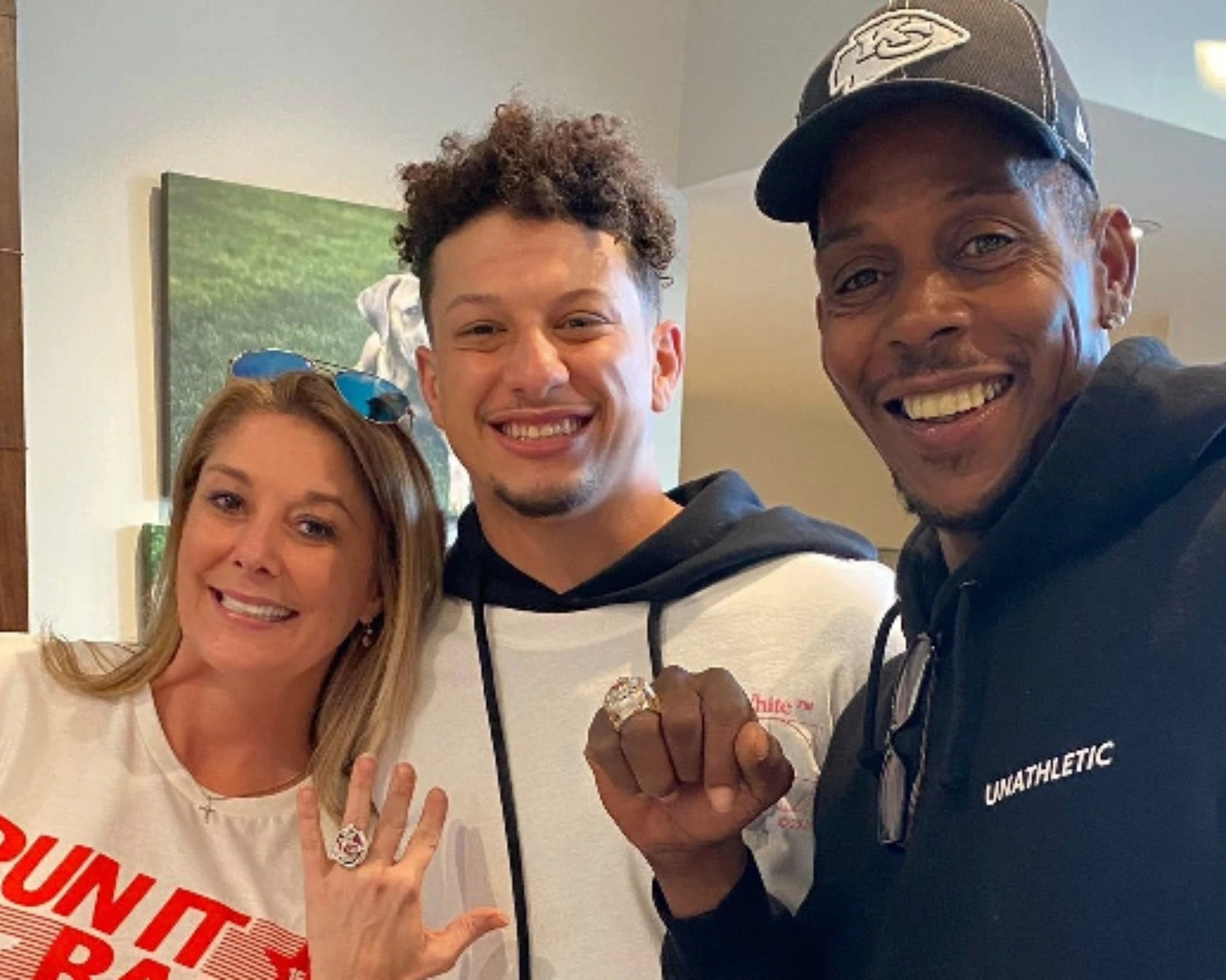
On the other side are those who worry about fairness, safety, and the physical advantages that male puberty can confer—even after hormone therapy. They argue that allowing transgender women to compete against cisgender women risks undermining decades of progress in women’s sports, where opportunities have long been hard-won.
Randi Mahomes, a mother of two athletes—a son who has conquered the NFL and a daughter who grew up on the courts and fields of Texas—finds herself at the intersection of these arguments. Her perspective is shaped not just by science or ideology, but by experience, empathy, and a fierce commitment to her children.
Randi’s Perspective: A Mother’s Love, A Competitor’s Insight
In her interview, Randi Mahomes made it clear: her stance is not about hate, but about fairness. “I love everyone,” she repeated, emphasizing that her concerns are rooted in what she’s seen as a parent and a participant in youth sports.
“I’ve watched my daughter compete,” Randi said. “I’ve seen how hard she works, how much she sacrifices. And I’ve watched my son grow up, too. There is a difference, not just in size or strength, but in how they develop. It’s not about saying one is better than the other—it’s about recognizing reality.”

For Randi, the issue is not theoretical. She points to the physical changes that occur during puberty, the differences in muscle mass, bone density, and speed. “It’s not just about hormones,” she explained. “It’s about what happens as you grow. You can’t ignore that.”
Her words echo a growing chorus of female athletes, coaches, and parents who have spoken out in recent years. From Olympic medalists to NCAA competitors, many have raised concerns about the competitive landscape, citing instances where transgender women have dominated events, set records, and, in some cases, displaced cisgender women from podiums and scholarships.
Science and Policy: The Search for Solutions
The question of fairness in transgender sports is not just a matter of opinion—it’s a challenge for science and policy. Medical experts agree that male puberty confers advantages in size, strength, and endurance. Hormone therapy can mitigate some differences, but not all.
A 2020 study published in the British Journal of Sports Medicine found that transgender women retain certain advantages even after a year of hormone therapy. The International Olympic Committee has struggled to set universal guidelines, with policies shifting over time and varying by sport.
Some governing bodies, like World Athletics and FINA (the international swimming federation), have recently adopted stricter rules, limiting transgender women’s participation in elite female categories. Others, including the NCAA, allow athletes to compete after a period of hormone suppression.
The result is a patchwork of regulations, confusion, and, for many athletes, anxiety about what the future holds.
The Human Side: Stories from the Field
Beyond the headlines and studies, the real impact is felt on the field, the court, and the track. Female athletes describe feeling demoralized, outmatched, and, in some cases, invisible. “I train my whole life for this,” said one high school runner, “and then someone who went through male puberty blows past me. How is that fair?”
Transgender athletes, meanwhile, share stories of isolation, harassment, and the struggle to find acceptance. For many, sports are not just about winning—they are about belonging, identity, and the chance to live authentically.

Randi Mahomes acknowledges these struggles. “I don’t want anyone to feel excluded,” she said. “But we have to be honest about what’s happening. If we don’t talk about it, we’re not helping anyone.”
Culture Wars and Public Opinion: Why Randi’s Voice Matters
The issue of transgender athletes in women’s sports has become a flashpoint in America’s broader culture wars. Conservative lawmakers have introduced bills to restrict participation, citing fairness and safety. Progressive activists have rallied for inclusion, framing the debate as a civil rights issue.
In this charged environment, voices like Randi Mahomes’ carry weight. She is not a politician, a pundit, or a scientist. She is a mother, a sports fan, and a member of one of the most prominent families in American athletics. Her words resonate because they are rooted in lived experience, not ideology.
Social media reaction was swift and polarized. Supporters praised Randi for “saying what everyone is thinking.” Detractors accused her of “transphobia” and “ignorance.” But most agreed on one thing: the conversation is overdue.
The Mahomes Family: Navigating Public Scrutiny
Being the parent of a superstar is never easy. Randi Mahomes is no stranger to public scrutiny, having watched her son Patrick rise from a high school phenom to NFL royalty. She has been a steady presence in his life, championing his career while shielding him from the pressures of fame.
Now, with her remarks on transgender athletes, Randi finds herself at the center of a different kind of spotlight. “I didn’t say this to be controversial,” she explained. “I said it because I care. Because I want my daughter to have a fair shot. Because I want every girl to know she matters.”
Her family has rallied behind her, emphasizing the importance of respectful debate and open dialogue. Patrick, known for his leadership on and off the field, has not commented publicly, but insiders say he supports his mother’s right to speak her mind.
The Future of Women’s Sports: A Crossroads
The debate over transgender inclusion is not going away. As more athletes come out, more parents speak up, and more governing bodies revise their rules, the future of women’s sports hangs in the balance.
Some advocates call for the creation of open or “third” categories, allowing transgender athletes to compete without displacing cisgender women. Others urge for more research, better guidelines, and a commitment to fairness for all.
Randi Mahomes believes the answer lies in honesty, empathy, and respect. “We can love everyone and still have hard conversations,” she said. “We can fight for fairness without hurting people. But we have to be willing to talk.”
A National Conversation: Beyond Sports
At its core, the debate is about more than athletics. It’s about how society defines gender, fairness, and inclusion. It’s about whose voices are heard, whose experiences are validated, and how we balance competing rights.
Randi’s remarks have sparked renewed discussion in schools, locker rooms, and living rooms across America. Parents ask what it means for their daughters. Coaches wonder how to set rules that work. Athletes, both cisgender and transgender, grapple with the emotional toll.
The stakes are high—not just for medals and scholarships, but for the soul of women’s sports.
Analysis: The Path Forward
As a journalist who has covered sports and culture for decades, I have seen debates come and go. But few have cut as deeply as this one. The challenge is not just to find the right policy, but to preserve the spirit of competition—the sense that every athlete, regardless of background, has a fair shot.
Randi Mahomes’ voice is important because it reminds us that sports are personal. They are about families, dreams, and the bonds that tie us together. Her concerns are not rooted in exclusion, but in a desire to protect what makes women’s sports special.
At the same time, we must listen to transgender athletes, whose stories of courage and perseverance deserve respect. The path forward will not be easy. It will require compromise, compassion, and a willingness to confront uncomfortable truths.
Conclusion: A Mother’s Legacy and the Future of Fair Play
In the end, Randi Mahomes’ remarks are a call to action—not just for policymakers, but for all of us. They challenge us to think deeply about what fairness means, what inclusion requires, and how we build a sports culture that honors both.
For Randi, the fight is personal. “I want my daughter to compete. I want her to know she matters. And I want every girl to have that chance.”
For the country, the debate is just beginning. The future of women’s sports depends on our ability to listen, to learn, and to lead with both heart and reason.
As the dust settles, one thing is clear: the conversation will continue, shaped by voices like Randi Mahomes’—honest, passionate, and unafraid to ask the hard questions.
